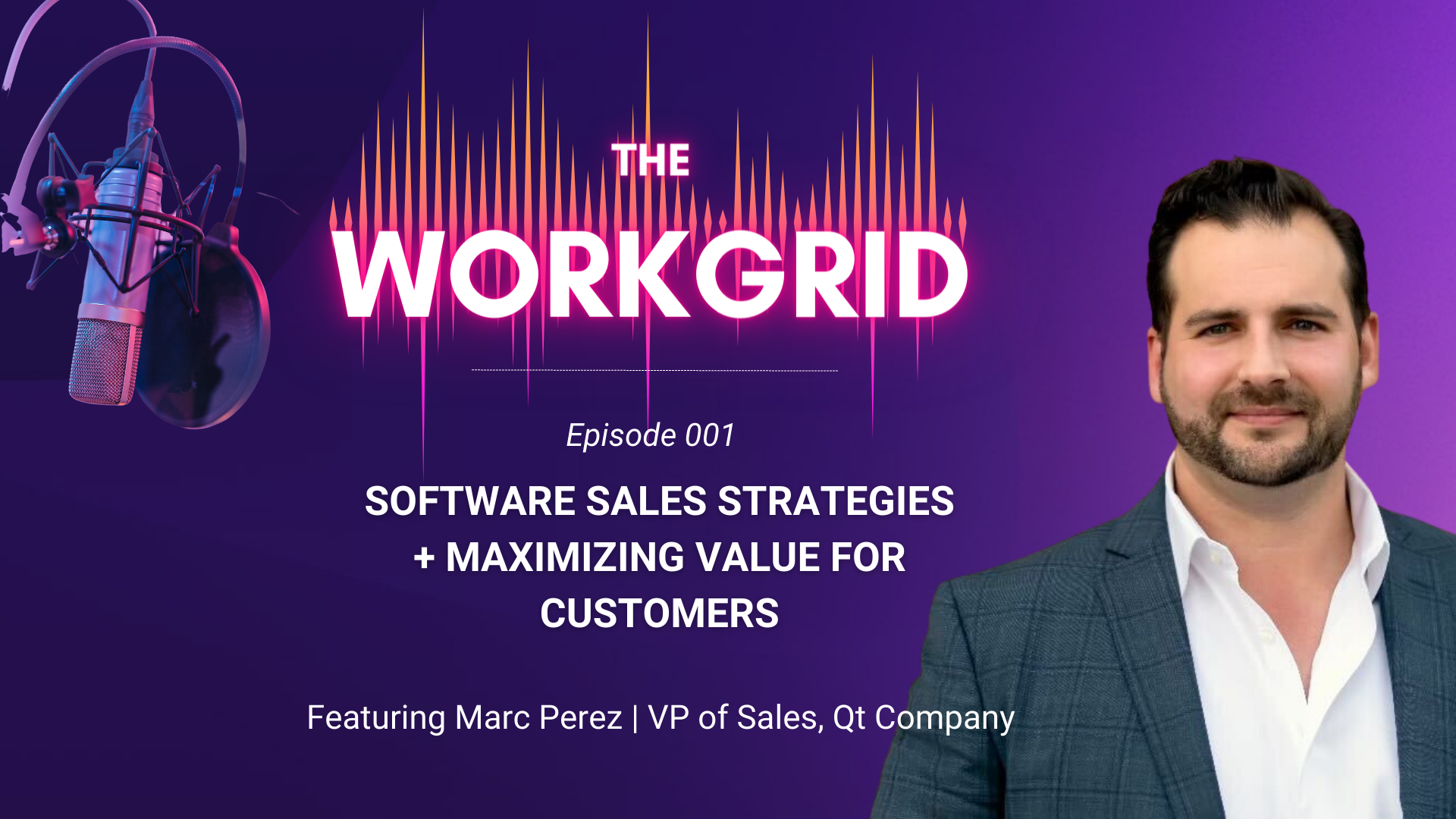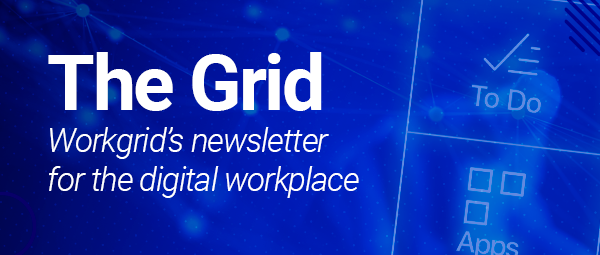In this episode of The Workgrid, Rob is joined by Marc Perez, VP of Sales for the QT Group. Marc and Rob dive into topics around delivering value to customers, developing a team, onboarding, leadership accountability, AE enablement, and the balance of remote and hybrid work – with a focus on the sales organization.
Here are the episode highlights:
What does it take to build a team that delivers value for your customers and what are the key differences between software sales and regions?
What it really comes down to is how do you want to service your customer?
There are no rights or wrongs when it comes to building a sales team, but in my experience, I like to start by looking at my strategy and developing a plan that makes sense to execute it. In most cases, that means matching the persona of the account executive with the profile of the prospect or customer. For example, when we think about our sales regions, each region is slightly different, and so our sales team has to be localized for clear communication – from language to vernacular and nuances – so we adjust to accommodate that.
QT group was split by state originally but ultimately, we had to divide up more granularly because how you talk to an SMB vs an Enterprise is very different. We must remember, what works best for us ultimately is what works best for the customer. At the end of the day, we need to strategize our team structure based on who our customers are and how we want to service them.
What qualities do you look for in account executives?
The hardest part of any managerial job are these two questions:
Do you have the talent?
Can you spot that talent?
Building a team of account executives can be a challenge because you need to find ways to ensure you have the right people, but sometimes it’s difficult to determine that early on. These are some of the trends I look for:
High accountability – Do they take ownership for situations and ask the questions to continue moving in a positive direction?
Adaptability to change – Are they able to block out the noise?
Determination – How do they tackle challenges?
One of the ways we are able to see their determination is in offer negotiations. Most of the time the account executive might want a compensation package that is higher than we are willing or able to give. Good players understand they won’t get 100% of what they want but will work with you and get creative. The way a potential hire negotiates their compensation shows they are listening, hearing the problem, taking an objection, and getting creative to solve the problem. It’s usually a glimpse of how they might handle different hurdles when trying to close a deal.
How do you get teams in place, onboarded, and put on the right path to begin their work?
Putting a team in place is an iterative process – and it’s never over. But to start, onboarding must be more than just “here’s a laptop, our website, and a quota – get started.”
We’ve tried to find ways to shorten the onboarding cycle however, so that more time is spent selling. I would estimate that onboarding is an average of six months for the QT Group. I like to have new hires complete a mix of activities like shadow calls, online learning modules, and tasking them with a company value proposition presentation to get comfortable with our products and company language. Then ultimately, we’ll start with a smaller quota that we then scale up. I want to build up my new hires instead of setting too high of expectations before they are fully enabled to succeed.
Providing your employees with the right tools is critical for success. As leaders, we must be aware of what type of culture we’re going to drive with the precedent set at onboarding.
I am a big proponent of promoting from within. If you’ve hired good talent, you should want to move talent up. So, I’d say a success story from our organization is really moving top talent through from sales reps up to directors.
How has your team adapted to the changing working models? Where are the customers today and how does that impact the sales process?
Like most organizations, our transition to remote work saw productivity skyrocket. But, moving forward we are looking to leverage the hybrid work model with employees in the office twice per week. We are growing and we want to remove silos so that new team members are able to share stories and learn from each other.
The thing is a sales team needs the knowledge sharing from wins and losses. Being in the office helps facilitate this. Plus – when you think about it from the customer/sales perspective, deals move at the water cooler and conversations in passing. What we can learn from each other doesn’t only apply to the sales team, it applies to customers as well.
Ultimately, organizations need culture and siloed remote work is not that. Finding the right rhythm in mixing face-to-face interaction with remote culture is a challenge, but something we are working toward.
What are some of the tools/technologies that help engage teams for hybrid work?
For customer outreach, social is still key. But for our internal benefit, we rely on chat.
Where do you see AI/ML impacting software sales process?
I am not scared of AI and machine learning taking over jobs. My philosophy is to embrace it, so it doesn’t make you obsolete. I see a world in which customers and reps will use technology primarily for research. But people will likely always want to talk to a human being following their digital research. Sales will have to evolve in that sense, but customer engagement will always be there. It’s a relationship business and customers want to know that they are getting the right care.
What’s your go to productivity hack for managing day to day sales and staying focused?
Waking up early to get ahead of the email rush is the first.
There are two types of people on a smart phone – those who can handle the red dots and those who cannot. I am one who cannot, so I utilize “do not disturb” mode which has helped tremendously to stay focused.
I also recommend blocking off an hour of the day to get through the things you are supposed to get through – make sure you are dedicating yourself to your job while also taking on all the other demands from below and above you.
What’s the most important lesson you’ve learned in your career so far?
Patience. Be patient and vigilant with the goals in your life. Make sure everything you do moves toward them but be patient because things do not come overnight.
If you could recommend one book or resource for mastering sales what would it be?
“How to win Friends and Influence People” by Dale Carnegie is a classic. Sales is a relationship business, and this book gives training and tactics that stand the test of time.
Another is, “Extreme Ownership” by Jocko Willink. This is a masterclass in how to be accountable.
About the Guest:
Marc Perez is the VP of Sales for the Americas at the QT company. QT is a global software company, trusted by industry leaders and millions of developers worldwide; proving cross-platform solutions for the entire software development lifecycle. You probably interact with QT-developed applications, smart devices, and interfaces every day and do not even know it.




